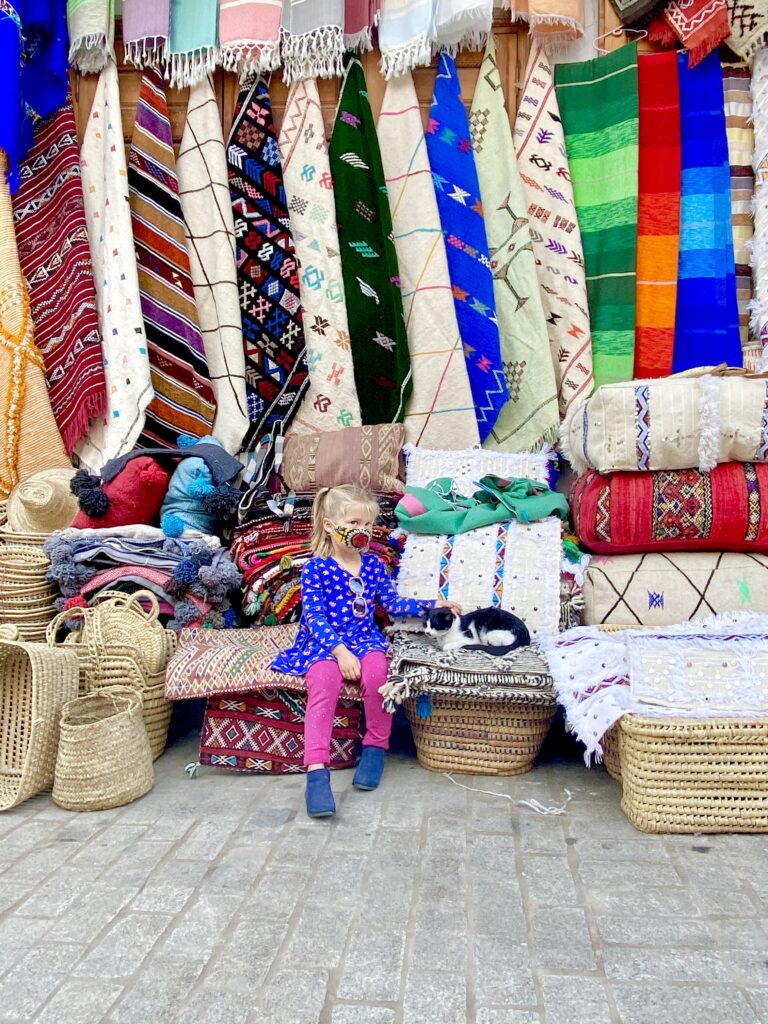6 Mistakes People Make When Moving to a New Country
One thing that keeps people from taking the leap to move abroad is the fear of making errors along the way. However, try to shift your mindset to one of growth, and consider mistakes as part of that growth. Here are five mistakes people make when moving to a new country. These are mistakes I made and you will probably make, too. But remember, these are also opportunities to grow and learn about your new home.
01. They assume that laws, norms, and rules will be the same as their home country
(Or believe their rights should be the same as in their home country)
When we first moved the Morocco, I was constantly stopped for speeding. The thing is, I was only going about 5 miles per hour over the speed limit–something I would never be stopped for in Montana.
This scenario is also common: I will be standing, talking to a Moroccan man, and if my husband walks up to join the conversation, the man I was speaking to will shift his eye contact and conversation to Ted. At first this made me and my inner feminist incredulous. That’s so rude, I thought.
My kids are not immune. when we first moved here, we would be walking through a busy part of the souk and total strangers would pick up my kids, kiss them, talk to them, and put them down. They were both blonde, cherubic little American kids–our whole family sticks out this way in a place full of people with beautiful golden skin and raven hair. As an American mother, though, every defense mechanism I have would light up.
Finding Your Way
I could go on. Everything from the way students behave to the way Islam is the main tenant of almost every law in Morocco. The examples of the ways in which laws and norms in the US are different from the laws and norms in Morocco. are endless. This will be true for any country you move to.
Now I know that speed traps are a thing and going 5 miles over the speed limit might get me stopped.
I also learned that it is a deeply ingrained cultural norm for a man to make eye contact with the other man in a conversation, rather than a woman (if she is present). I can either get my undies in a bunch about it, or i can understand that it’s not an issue of anyone being rude. Can I wish it were different? Yes. Does it make me appreciate the way gender equality (sometimes) manifests in the US, sure.
Strangers picking up my kids stopped with the onset of Covid. However, I also taught my girls how to say “No thank you”, or to put me between them and said stranger and I would say “No thank you.” When it happens now, usually it’s just a pat on their little blonde heads and they almost don’t notice it. This one continues to be a challenge for me, but I also understand that it comes from a cultural place where children are revered and loved, and from a people who continue to raise children in the proverbial ‘village’ that has been lost in the US.
You simply cannot live your new life in your new country expecting to be treated the same way you are treated in the US. Not only are laws different (and by proxy, rights are different), but morals, norms, behavioral expectations, gender roles, acceptable clothes, and on and on. Must you bend yourself into a pretzel to never be offended or to always be okay with whatever is happening? No. Especially where your feeling of safety is concerned.
My advice to you

Expecting different treatment because you are an American, or tossing norms in the face of local people, is akin to the loud, slow-talking tourist above. It’s just insensitive.
Instead, work to understand the laws, social norms, and culture of the place you’re going. If people dress conservatively, leave the daisy dukes behind, or save them for when you’re hanging out with other Americans. If you know it’s a norm for people to smooch your kids and you don’t like it, walk between them and the crowds, or learn how to say no, thank, you without losing your shit and placing your American norms on someone else.
Understanding someone else’s perspective doesn’t mean you agree with it, but it will help you understand the root–the intention, the place from whence their actions or expectations come.
02. They assume that English is widely spoken everywhere.
Yes, thanks to colonialism, in many, many countries English is, at the very least, a common second language. However, there are many countries where it is not. This is a common mistake people make when moving to a new country.

For example, in Morocco the language is a branch of Arabic called Darija. The next most common language is French. More and more young people are learning English, especially since the minister of education recently changed the language learned in schools from French to English. This process will take longer than our time here.
It has been essential to learn even basic French and/or Darija to function successfully in this country, even though–due to our working at an American school, where English is the language of instruction–we have many English speaking circles. At the fruit and vegetable stands, the grocery store, restaurants, and while traveling, knowing the more common languages helps.
We’ve all seen (or maybe been?) the tourist who, when confronted with a local person in a country they are visiting who does not speak English. Said tourist will speak more loudly and slowly…still in English, maybe adding a pantomime. This is not only rude, but assumes that the person is either deaf or stupid just because they don’t know your language. Skip this entirely–it’s awful. Instead, invest a little time in learning the language of the place you’re going. At the very least try.
Yes, you’ll sound like an absolute fool. Yes your pronunciation will be kindly corrected again and again. But when you try you show that you respect the other person and the place in which you find yourself. Ted is an expert at this, and people love him for it.
03. They don’t expect “The Slump”, and then get clobbered by it
One mistake when moving to a new country is losing touch with your mental health. The excitement and the newness take up all of our time, so focusing on ourselves takes a back seat.
“The Slump” is a period of time after you move to a new country, when the adrenaline from moving and that ‘tourist’ feeling wears off. The Slump often starts with a massive landslide of culture shock which can lead quickly into regret (what have I done!) or feeling depressed, isolated, and frustrated at every turn.
Usually, the slump hits around months 2-6, but can really happen at any point during the first year in a new place.
The key is this: expecting the slump, and preparing for it, makes it much easier to deal with.
- When you’re still in the energetic, excited new phase, build a community. Meet people, go for coffees or lunch, join language learning groups. The only reason I still have Facebook is to network when I’m abroad.
- Don’t rely on social media to feed the social animal in you. This will keep you at home, in bed, longingly staring at what a great time your friends are having ‘back home’. FOMO will set it and you’ll just make it worse.
- Know that it will pass
- Be gentle with yourself. Rest, relax, make nutritious food, spend time with people who are also newbies and a few seasoned veterans.
- Get involved in meaningful work. If you moved to a new country to be a digital nomad, or you moved somewhere alone to do some soul searching a la Liz Gilbert, good for you; and also remember that purposeful work connects us to place and people in meaningful ways.
- Recreate spaces, meals, and routines from home. Put your favorite quilt from home on your bed or arrange your bedroom like it was back home. Make your favorite comfort foods, listen to favorite music or podcasts, go for walks or get a workout. Get into routines that you had when you were at home to help your body feel like, ‘hey…this is okay. We’re ok.’
- Seek help if you need it. Often, schools (if you’re working at a school) or embassies have a connection with a counseling service, you can look up a local provider. Or, there are online options like Better Help or Online Therapy can work for some.
04. They expect everything in America to be available in the new country, including Amazon
Rethink moving to a new country immediately if this is an expectation you have.
Not only is Amazon not available everywhere, but in most places shipping anything in comes with a hefty customs tax. No problem, because really, shipping stuff all over the world is insanely damaging to our environment. Consider this an opportunity to simplify your life. Becoming less dependent on all the stuff is a gift.

Further, items and brands you’re familiar with like skincare, medicine, packaged food, and clothing will be different where you’re moving. It took me about 2 years to fully adapt to finding ‘like’ items to the ones I was used to in America, and now in many cases (French skincare, ooh la la!) I prefer what I can get here to what I can get in America. (Okay, Cheezits are still one American thing that I sometimes dream about…)
My best advice is threefold:
- Connect with someone who lives in the place you’re moving to to find out if your favorite brands/items are available. Facebook is great for this.
- Pack enough to get by for 6 months or a year.
- Use pinterest to find “dupes”. Use pharmacists or the doctor at the US embassy to find out which medications compare to US OTC medications. Hit the bricks to investigate substitutions when it comes to clothes and food–living in a new place is partially about using what you can find there, right?
- Shop local. And, in the case that you still prefer your US based brand, add it to your list for your next visitor to bring to you.
05. They expect to blend in
The levels of “standing out” vary from country to country. But believe me, no matter where you go–even if people look like you, you will stand out for so many other reasons. Whether it’s your accent or the way you grocery shop. And that’s okay. However, for some this causes a level of discomfort that borders on embarrassment and can be paralyzing to the point of never trying anything new.
Embrace the ways in which you are weird in your new country. Sure, learn and adapt as you spend more time around people who live there. Join groups to learn the language, attend dinners when you’re invited. Ask questions.
06. They stick to familiar experiences only
You’ll find “American” experiences wherever you go. There are two Starbucks in Rabat and a Duncan Donuts up the street from our house. McDonalds is prolific. There are resorts here that cater to Americans and Europeans. This is true almost everywhere.
But is that why you want to move abroad? To plug your American life into different scenery? No.
Learn the difference between creature comforts and trying to recreate your American life in a new country. Get out of your comfort zone and embrace the place you’ve moved to.
Meet the people of your new ‘home’ who’s families extend back generations, listen to their stories. Learn the ways that parenting is different. Try new foods and new vacations. Get a little lost (or a lot lost) and remember what it’s like to figure it out. It will be worth it, I promise.
Here’s the deal: You’ll make mistakes when moving abroad. Embrace being the new kid and being clueless and sometimes being a spectacle. It’s part of growing into a person who is okay with messing up now and then.
